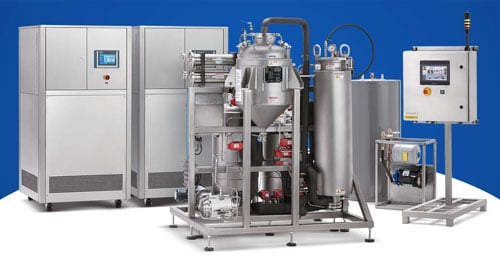Hydrocarbons are the ultimate solvent in the extract market for creating a high-quality concentrate product. Strong enough to pull massive amounts of cannabinoids from any quality cannabis and hemp biomass and gentle enough to keep the sensitive terpenes intact in the end product.
Butane hash oil (BHO), or hydrocarbon extraction, is the MVP of the concentrate game. Everyone from medical marijuana patients to recreational consumers to extraction technicians, overwhelmingly, prefer cannabis concentrates made using light hydrocarbons such as butane and propane.
Light hydrocarbon solvents (butane and propane) have been the powerful, nonpolar compounds favored by the upper echelon of artisan edible makers.
From the colorful, sugar-frosted gummies to the rich and decadent fudge brownies cheekily laced with cannabinoids, these infused edibles are used for their therapeutic, and often, intoxicating effects.
For home amateurs, an easy ISO quick-wash can produce a rudimentary and solvent-free extract without blowing up the house. For commercial extraction, butane and propane extraction for concentrates provide the highest possible quality, purity, and throughput.
Butane honey oil is the golden and resinous sap that contains a treasure trove of cannabinoids, terpenes, and other active compounds ready to give concentrate users the relief they need. Also known as butane hash oil, butane honey oil is the pinnacle of marijuana extracts in terms of potency, flavor, aroma, purity, and safety.
In today’s rapidly expanding world of concentrates, it’s hard to keep track of all the available information about exciting new extract forms. While BHO extraction was popularized in the late 1990s, new technologies and techniques have enabled extraction technicians to produce even more flavorful and potent extracts than ever before.
In the world of cannabis extraction, light hydrocarbon extraction is the gold standard for producing everything from cannabinoid distillates to full-spectrum concentrates featuring a range of therapeutic cannabinoids, terpenes, flavonoids, and other compounds. Butane and propane, in particular, are the go-to solvents used to separate cannabis resin from the rest of the plant matter.
BHO vs. CO2 Hemp Extraction: Battle of the Big Two Extraction Methods
Cannabis concentrates are a must-have product offering for brands looking to reach a growing cannabis consumer base. Concentrated cannabis compounds can be used to make a wide range of medical and recreational products such as topical ointments, edibles, capsules, transdermal patches, suppositories, and small-batch extracts. While THC concentrate products currently dominate the adult-use market, hemp-derived CBD concentrates are tapping into the trending and lucrative health and wellness segment.
As the cannabis concentrate market balloons to an estimated $8 billion in sales by 2022, business-savvy and licensed marijuana producers are making the measured investment in a professional closed-loop extraction system. Cannabis extraction equipment can increase profits and reduce processing costs associated with trimming and curing flower for many wholesalers. Concentrates command a higher price per item compared to flower (buds) and include a range of products such as odorless distillate oil for edibles or flavorful terp sauce for those with a more discerning palate.
Cannabis concentrate popularity may slowly dwarf flower sales with estimates that see extracts reaching over $13.78 billion in revenue by 2026. High-quality concentrates such as distillates and high-terpene full-spectrum extracts (HTFSE) can be used to make everything from vape cartridges to edibles to topicals for a consumer base starving for product variety. Solvent-based extraction methods are typically used to produce higher, safer, and purer yields than amateur and dangerous open-blasting techniques.
Hydrocarbons such as butane and propane are the solvent of choice for many licensed manufacturers when making butane hash oil (BHO) concentrates. Butane is non-polar and has a relatively low boiling point (31.1ºF), which is particularly helpful when preserving terpenes with lower boiling points than cannabinoids. Besides the solvent solution used, manufacturers must consider multiple factors to determine how much material their equipment will be able to process in a shift.
Butane Hash Oil (BHO) Frequently Asked Questions
Butane stands apart from other popular extraction solvents such as carbon dioxide (CO2) and ethanol in its efficacy at separating cannabis and hemp's full chemical profile of therapeutic cannabinoids and terpenes.
BHO Stigma — Truths, Misconceptions & Falsehoods of Butane Hash Oil
The world of cannabis oil extraction is riddled with bad or outdated information. Most of the negative press BHO extraction receives actually serves the agendas of competing groups rather than as viable health or safety warnings. The CO2 industry's path to popularity, in particular, was paved by sensationalized stories of home explosions from open loop butane extraction, and misinformed claims of impurities in the end product.


